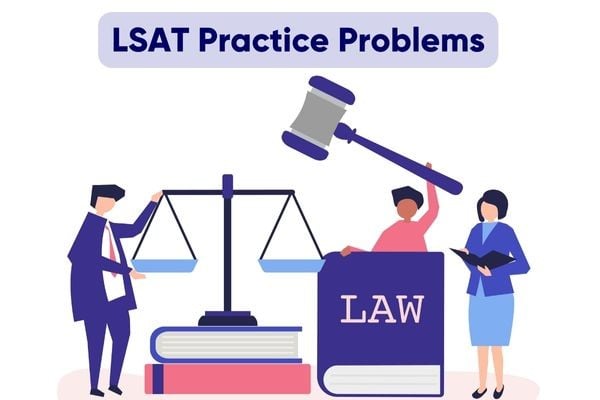Even the easiest law schools to get into require the submission of your LSAT score, which is why you need to start preparing with LSAT practice problems. In this article, we will go over the hardest LSAT practice problems and their solutions. Let’s dive in!
Want us to help you? Applicants and students, book a free strategy call here. Universities, businesses, or student organizations representative, book a free call here.
Analytical Reasoning Selection Games
LSAT Practice Problem 1:
LSAT Practice Problem 2:
LSAT Practice Problem 3:
LSAT Practice Problem 4:
LSAT Practice Problem 5:
Analytical Reasoning Matching Games
LSAT Practice Problem 6:
LSAT Practice Problem 7:
LSAT Practice Problem 8:
LSAT Practice Problem 9:
LSAT Practice Problem 10:
Analytical Reasoning Hybrid Games
LSAT Practice Problem 11:
LSAT Practice Problem 12:
LSAT Practice Problem 13:
LSAT Practice Problem 14:
LSAT Practice Problem 15:
FAQs
1. What kind of LSAT practice problems should I prepare with?
You should prepare with a mix of Reading Comprehension, Analytical Reasoning (logic games), and Logical Reasoning questions, as these are the primary sections tested on the LSAT. It's also beneficial to practice with real LSAT tests and the writing sample to familiarize yourself with the test format.
2. How should I prepare for the LSAT?
Prepare for the LSAT by consistently practicing with real LSAT practice questions, understanding the reasoning behind each answer, and taking timed practice tests to build stamina and familiarity with the test format. Consider using prep books, courses, or tutors to enhance your understanding and strategies.
You can also get expert help through an LSAT prep course! Check out some BeMo Academic Consulting reviews on Trustpilot to learn how we can help prelaw students like you!
3. What LSAT score do I need to get into Law school in the US or Canada?
In the US and Canada, LSAT scores for law school admission typically range from the 140s to the high 170s, with top-tier schools often seeking scores above 165; however, specific score requirements vary by institution, and other factors like GPA and extracurriculars are also considered. It's essential to research each target school's average LSAT score for admitted students to gauge competitiveness.
4. What do I need to get into law school in the US or Canada?
To get into law school in the US or Canada, you typically need a bachelor's degree, a competitive LSAT score, a strong GPA, letters of recommendation, and a well-crafted law school personal statement; additional factors like extracurricular activities and work experience can also influence admissions decisions. It's important to check specific law school requirements for each target school, as they can vary.
5. How hard is it to get into law school?
Law school acceptance rates in some law schools in the US and Canada are quite low, which makes it very difficult to get accepted. However, each school has its own criteria, with some being more lenient than others when it comes to GPA and LSAT requirements. There are many options available, so make sure to apply to those schools where you would be a fitting applicant.


Have a question? Ask our admissions experts below and we'll answer your questions!
Anything we didn't cover? Have a question? Ask below or share your comments!
Comments